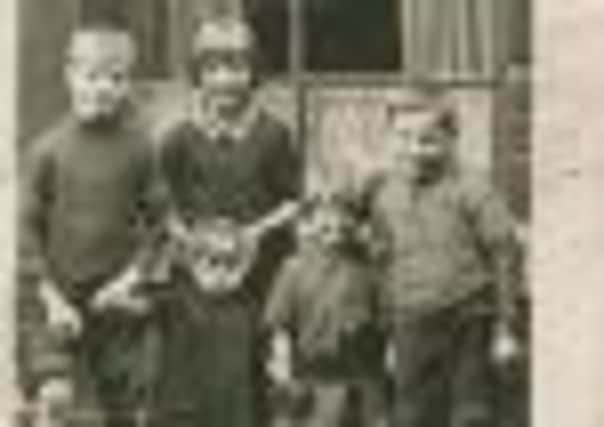Despite the hardships, lots of happiness for Betty...


Betty, who was one of eight children, recalled her early years living in a one-up-one-down house in Dale Street, and what happened later when the whole street moved into new council houses.
This week Betty continues her story with recollections of the war, club trips, Saturday matinees at the Collins Cinema, and the time when she was admitted to hospital with scarlet fever.
Advertisement
Hide AdAdvertisement
Hide AdBetty, who is 83 and now lives in Thornhill, said that despite the hardships of life in those days, there was much happiness and friendships were formed which lasted a lifetime.
She still meets up once a month with two friends she grew up with and who she worked with at Newsome’s Mill, Batley Carr.
Betty (nee Clayton) has been married for 62 years to husband Norman whom she met at a church dance when they were both 16.
This week we continue her memoirs of childhood.
“WHEN we went to school we didn’t have school uniforms and we had the same teacher for everything we did, sums, writing, reading, history, geography.
Advertisement
Hide AdAdvertisement
Hide Ad“If you were a bit well off you could go to the Grammar School but only if your parents could afford to pay.
“We never had school outings and the only time we went anywhere other than our hometown was on a club trip.
“Batley Carr Working Men’s Club took us to the seaside once a year. We all had a ticket tied to our coats with our name on it and the name of the club we were with.
“It was really exciting at the railways station watching this big steam train pulling in, and we all boarded into the same carriages and off we’d go.
Advertisement
Hide AdAdvertisement
Hide Ad“We would arrive at a seaside town, a different one every year, and be taken in groups down to the sands with one committee man looking after each group
“We all got a bag of sweets, a bucket and spade and sixpence for an ice cream cornet.
“At teatime we went back to the train station, got our train home and our mums and dads would be waiting to pick us up and take us home tired out.
“The only other treat we ever got was going to the pictures on a Saturday afternoon. It was only one penny but mother couldn’t afford for us all to go at one go. We went two at a time, and then it would be a few weeks before we could go again.
Advertisement
Hide AdAdvertisement
Hide Ad“We would queue for the doors opening at 1 o’ clock, and then it was one mad rush to get inside.
“They were all black and white films and they were always breaking down and then we would all ‘boo’ until it came back on.”.
BETTY, who wrote her memoirs for her grandchildren, recalls the war years when two of her brothers and a sister served in the Forces and life took on a whole new meaning for everyone.
She recalls: “We couldn’t go out at night because there were no street lights and we had to have black-out curtains so that no light could be seen from our windows.
Advertisement
Hide AdAdvertisement
Hide Ad“Once it got dark, it was always pitch black outdoors and a man used to walk the streets to make sure no lights were showing outside. If he saw any, he would knock on your door and shout ‘Put that light out!”
“Also during the war children were evacuated from London and we had two evacuees, both brothers, staying with us.
“London was getting bombed a lot but here in Yorkshire we didn’t do too bad. We didn’t have any electric lights in our house. It was all gas and the gas light would hang from the ceiling and had to be lit with a taper.
“There were no lights upstairs and we went to bed with a candle and once we were all in bed it was blown out. There was a gas meter in which you put pennies, and if it ran out of money and mother had no more left, we had to go knocking on doors .
Advertisement
Hide AdAdvertisement
Hide Ad“We’d ask neighbours if they had any empty pop bottles they didn’t want, and if they had we would take them to the shop and get one penny each for them.
“We would run home and the gas would go back on. If we didn’t manage to get any bottles we had to manage with candle light and the glow from the coal fire. Betty still remembers the hardships children had to put up with but she also remembers that they were always happy, clean and well fed on good wholesome food.